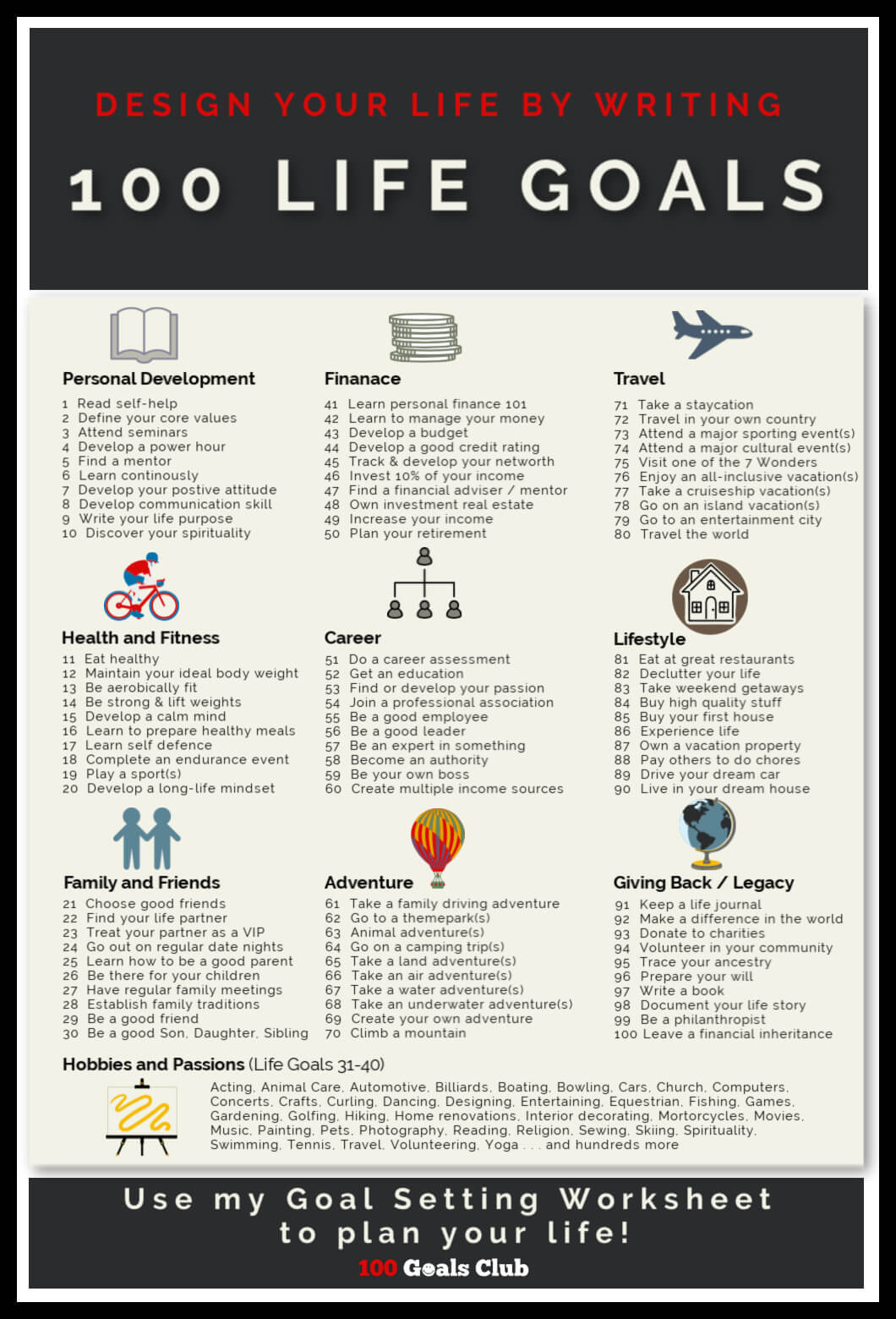How to set life goals
One of the key questions asked by people looking for help with life goals is "How to set life goals".
You may have never set a goal for yourself before. That's okay. You are in the right place to learn about how to.
I consider brainstorming to be an essential component of setting life goals, but only after doing some key work.
Preparation for "how to set life goals"
The following are 6 key preparation steps in preparing for how to set life goals:
- Reflect on the areas of your life that are most important to you. Beyond materialistic things (luxury homes, cars, travel etc.), what are the things in life that mean the most to you.
- Ask yourself what is it that you are good at or would like to be good at based on your life so far?
- Ask yourself if there are other areas that your friends and family or colleagues would consider you good at, as potential areas to set life goals around.
- Consider your core values (Life Goal # 2), starting with core values you already understand about yourself or by taking time to work on them. Why? So that you focus your life goals on values that are core to who you are or want to be. The natural tendency in goal setting is to focus too much on material goals, travel goals and "bucket list" type goals. There is nothing wrong with these type of goals, but they shouldn't be the main focus.
- Consider your life purpose (Life Goal # 10), so the you will set life goals that are aligned with what you want your life to be about. The natural tendency in goal setting is to focus too much on material goals, travel goals and "bucket list" type goals. There is nothing wrong with these type of goals, but they shouldn't be the main focus.
- Review the recommended goals at the 100 Goals Club and highlight the ones that speak to you. Reference the "10 Life Goal Categories" and the "Design your life by writing 100 Life Goals" below to get you thinking.
 It is much easier to figure out how to set life goals by reviewing someone else's goals list and deciding what works for you.
It is much easier to figure out how to set life goals by reviewing someone else's goals list and deciding what works for you.The 10 life goal categories
There are other goal categories of course. These are the ones I've distilled down from spending countless hours working to identify the most important categories. But feel free to create your own categories if it feels right for you.
Start brainstorming!
Depending upon how you like to capture your thoughts and ideas, you can use one of the following tools to start your brain storming:
- Get and use a blank hard copy journal
- Open an excel spreadsheet and start listing (brainstorming) potential goals. You can also use my free goal setting worksheet to do this. Request it here.
- Buy an "APP" on-line that helps with setting goals.
- Use a "Notes" application within your smart phone or tablet
I recommend finding somewhere quiet by yourself to work on this. If you like natural settings or surroundings, go to a park or a body of water. This will help put you into a reflective mind set for thinking about your life and your goals. Allow at least an hour for this, two if possible.
WITHOUT THINKING TOO MUCH, START WRITING DOWN POTENTIAL LIFE GOALS. Don't rationalize them yet. Let the ideas come out and write what comes to mind. Keep writing as long as the ideas keep flowing.
Rank Order and Prioritize your goals
Once you have a brainstormed list of potential life goals, you are a big step closer on how to set life goals.
Now is a good time to decide how many life goals you want to focus on now. Although this is the 100 Goals Club and the objective of many will be to create 100 life goals for yourself, your can start with any number. When I turned 40, I decided to write down a list of 37 Life Goals to achieve. Why 37? Good question! I'll write about it a future blog. But just know your can choose any number you like. Multiples of 10 are a good choice too.
If you are like me, you'll want to put your goals into 1, some or all of the 10 goal categories that I recommended above.
Work to distill your list down to the number that speaks to you.
Days, weeks or months later . . . get SMART!
Once you've got your distilled list of "X" goals, now is the time to get serious about writing proper goals. SMART goals in fact. The world of goal setting most often use the acronym "SMART" goals to help write good quality life goals.
SMART goal setting starts with understanding the "SMART" acronym:
S - Specific
M - Measurable
A - Attainable
R - Relevant
T - Timebound
Each of these is detailed below:
SPECIFIC
Be very specific about your goals. The following table illustrates a poorly written goal that is not specific, and a well written goal that is.
|
Poorly Written Non-Specific Goal |
Well Written Specific Goal |
|
I want to lose weight |
I will achieve my optimal body weight of 160 lbs before my Xth birthday. |
|
I will travel the world |
I will travel to a major city on each continent before I turn 50. |
|
I want to get in shape |
I will be able to do 50 push-ups and run a mile without stopping, by May 1, 2023. |
|
I want to make more money |
I will increase my income by $ 5,000 within the next year by Dec 31, 2022. |
MEASURABLE
Goals need to be measurable in terms of knowing whether or not you have achieved your goal or not. A goal that says “I want to lose weight” is not measurable. A goal to lose a total of 25 lbs is.
ATTAINABLE
Your “Target” goals need to be attainable. Your “Outrageous” goals do not. Select Target Goals that any reasonable person, specifically you, will say that with dedicated effort and time, the goal is an attainable goal given your current circumstances in life.
If you currently have a 65% average in your Senior year of High School and want to go to University to be a Veterinarian or a Doctor, its not realistic to think you could attain that goal due to the high entrance averages required for these programs, typically 90%+.
As an outrageous goal however, if you are passionate about this, definitely write it down.
RELEVANT
Smart goal setting needs to be relevant to your life. To use the above example of being a Doctor, if you currently have very little interest in the medical field and want to be a Doctor because of the high-income potential or your parents wanting this for you, I would suggest to you this goal is not relevant to who you are as a person.
Choose goals that are relevant to you and the life you want to live.
TIME BOUND
The time component of SMART goal setting is to be time specific by saying when you will accomplish your goal.
In setting Life Goals, because of the longer-term nature of these goals, the aspect of time achievement will likely be longer term than if you were establishing goals with a shorter horizon. It is best to establish goals which are a balance of short, medium and long-term goals.
If all your goals can be accomplished within the next year then you are setting your goals too easy. If they will all take a “lifetime” to achieve, then they’re too difficult.
This guide will help you set goals which are a balance of goals you will accomplish within the next year, 5 years, 10 years and within your lifetime.
Goals need a timeline to create a sense of urgency to get them done. Without a firm due date that you commit to, your goals will drift.
You don’t need to worry about doing this for all 100 Goals right now. Pick the most important top 5, 10 or 20 that you will be serious about achieving and give them firm due dates.
Some of the goals you set will have a recurring time frame, meaning that you want to commit to achieving them annually or each decade.
Check out the following poster for how to write a goal . . .
How to write a goal
For further helpful information and 5 key points on how to write a goal, click here.
By this stage, you should have the essence of how to set life goals in hand and be well set for finalizing your life goals.
I like to set a deadline or milestone before I consider them "final". Having said that, you should never feel fully locked into a life goal should your circumstances change.
The end of a calendar year, a birthday or a milestone birthday works best for me in terms of choosing a date.
If you haven't yet received it, request my free goal setting worksheet to "transpose" your final goals into.
To check out the home page for other valuable information including specific links to each of my recommend 100 life goals, click Life Goals home page.
Last updated: December 7, 2022.




